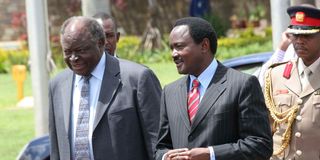Fake ‘ground’ support and hired crowds

The late President Mwai Kibaki (left) and Wiper leader Kalonzo Musyoka on May 8, 2009. In 2007, Kalonzo Musyoka left Raila Odinga to try his luck as a presidential candidate. Mwai Kibaki’s political spies discreetly sponsored crowds to attend Kalonzo's inaugural rally at Uhuru Park to cheer him and ensure he did not think otherwise and return to Raila’s fold.
In Mathew Chapter 21, the Bible talks of Jesus’s triumphant entry into Jerusalem. The crowds cheer him with great happiness. A few days later, Jesus is crucified with many electing a thief to be released instead of Jesus despite his moral intentions to do good for them.
Why did Jerusalem people cheer Jesus when they had a hidden agenda to crucify him when it mattered most?
Logic demands that in public affairs people should express themselves clearly whenever they are dissatisfied with any leader. They can do this either by booing or picketing or negative body language.
But there are instances where people do the very opposite. They show warm reactions towards a leader that they dislike.
In the run-up to the 2022 elections, I visited UDA offices in Nairobi and met a friend who was working there. I sought his views about the Kiambu UDA gubernatorial nominations, which were scheduled for the following week.
He held the firm view that Waititu Baba Yao would win. He cited the very warm public reception Baba Yao received whenever then-presidential candidate William Ruto introduced him in a crowd in Kiambu.
Baba Yao
He was right. Kiambu crowds used to get wild whenever Baba Yao appeared during UDA campaigns. I did observe this many times. But given that I had some interests in that county, I soon found out that the “ground” murmurs suggested something else.
Clearly, there was a mismatch between those murmurs and public appearance. Indeed in some nominations, UDA results did in fact show that all that glitters is not necessarily gold, especially when someone else won the nominations by a huge margin.
The same phenomenon of a mismatch between public appearances of popularity and reality on the ground happened in Gaturi Ward by-elections, held after the death of an incumbent MCA in 2020. I was the Senate Chief Whip and the ward is part of Kiharu, my home constituency. I was tasked with campaigning for the Jubilee candidate.
My ground feelers consistently conveyed the message that the electorate did not favour Jubilee. However, whenever we appeared before residents as part of the Jubilee brigade, there would be warm reception. Jubilee lost by a huge margin.
Raila Odinga has constantly experienced this phenomenon of "illusory" good reception that does not morph into votes. His meetings attract thousands of enthusiastic supporters but he has never won any election.
George H Bush was an American president who fought against Iraq's President Saddam Hussein in the first Gulf War.
His popularity skyrocketed with some opinion polls giving him 95 per cent approval ratings. But he lost the next election to Bill Clinton. The same thing happened to Winston Churchill, who led Britain to fight against Nazis and got enthusiastic crowds to welcome him home but lost to Clement Atlee in 1945.
Several factors cause this mismatch between public appearances and the actual measurement of the popularity of a candidate. Public affection can be sponsored. One's sophisticated enemies can plot and sponsor a crowd to cheer him with the sole intention to create fake feelings of popularity.
In 2007, Kalonzo Musyoka left Raila to try his luck as a presidential candidate. Mwai Kibaki’s political spies discreetly sponsored crowds to attend Kalonzo's inaugural rally at Uhuru Park to cheer him and ensure he did not think otherwise and return to Raila’s fold.
In 1992, Kenneth Matiba returned to Kenya from London to a great triumphant and jubilant crowd in Nairobi. He had gone to London immediately after his release from detention to recuperate and prepare for the first free multiparty elections.
The then President Daniel Moi was fearful of facing a united opposition of Matiba and Jaramogi Odinga. Later, it was discovered the jubilant Nairobi crowd was partly sponsored secretly by the Moi government to encourage Matiba to vie on his own independently by creating an illusion of great public affection.
Fake enthusiasm
Similar fake enthusiasm can be caused by a disliked bearer who nevertheless has lots of money. The people may reason that if they express their true feelings by booing, the leader may leave without giving handouts. The people’s joy would thus be a ploy to get money.
The leader can also be an entertainer whose popularity is based on some other traits. For example, one can be a musician or comedian or sports person. These traits cause public displays of affection, which does not necessarily translate into votes. I know one popular radio presenter who has lost elections consistently despite his huge influence.
How can one discern fake public displays of affection? Scientific opinion polls. Very few politicians apply science but objective polls help one to ascertain true electoral trajectory. Some politicians fear the truth, though.
Having reliable ground feedback mechanisms helps. However, ground feedback depends on the predisposition of a candidate. If he or she prefers flattery, the feedback will always be tailored by his handlers to be positive irrespective of ground reality.
Dr Kang’ata is the governor of Murang’a County





